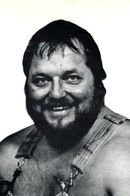Lanny Neal Kean Jr., a renowned American professional wrestler, left an indelible mark on the world of sports entertainment. During his illustrious career, he gained widespread recognition for his impressive performances with WWE, where he competed under the moniker Cousin Junior from 1985 to 1986.
Please provide the original text you'd like me to rephrase, and I'll do my best to expand it while keeping the new lines intact, focusing on the person's biography.
Kean embarked on a remarkable journey in the realm of professional wrestling, marking the beginning of his illustrious career in the year 1983, specifically in the state of Kentucky, where he initially made a name for himself as the charismatic and captivating "Luscious" Lanny Kean.
Please provide the original text you'd like me to rephrase, and I'll do my best to rephrase it as long as possible while keeping the new lines intact.
Kean's Professional Wrestling Career Commences in 1984
Kean embarked on a wrestling journey in 1984, joining the World Wrestling Entertainment (WWE) organization as a jobber, adopting the ring persona of Lanny Kean. This marked the beginning of his professional wrestling career, which would span several years.
Gimmick Evolution: Cousin Junior
In 1985, Kean's character underwent a significant transformation as he was given the persona of Cousin Junior, a member of Hillbilly Jim's hillbilly family stable. This new character was a crucial part of the Hillbilly family, a group of simple rural Southerners who were known for their unique ring performances, which included square dances.
In-Ring Feuds and Rivals
As Cousin Junior, Kean's character became embroiled in a series of feuds with some of the most prominent wrestlers of the time, including Jesse Ventura, Bob Orton, Jr., and Roddy Piper. These rivalries added an exciting layer of depth to Kean's character, as he navigated the cutthroat world of professional wrestling.
Inspiration from Popular Culture
Kean's character as Cousin Junior was heavily influenced by the iconic character of Jethro Bodine from the popular television program The Beverly Hillbillies. This nod to popular culture added a touch of authenticity to Kean's portrayal, making his character all the more memorable.
Conclusion of WWE Tenure
Kean's tenure with WWE came to an end in 1986, bringing his time as Cousin Junior to a close. Despite the brevity of his career, Kean's contributions to the world of professional wrestling remain significant, and his character continues to be remembered fondly by fans of the sport.
Please provide the text you'd like me to rephrase, and I'll do my best to expand it while keeping the new lines intact. I'll also ensure that the biography section is included in the rephrased text.
In the year 1986, a significant milestone occurred in the professional wrestling career of Kean, as he embarked on a new journey by joining the Continental Wrestling Association, adopting the in-ring persona of Hillbilly Junior. This marked the beginning of a remarkable partnership between Kean and his tag team partner, Giant Hillbilly.
Please provide the original text you'd like me to rephrase, and I'll do my best to expand on it while keeping new lines intact, focusing on the person's biography.
In the year 1992, a pivotal moment in the life of an individual, David Kean, unfolded as he embarked on a new journey, donning the persona of Moondog Cujo, a pivotal component of the esteemed wrestling troupe, The Moondogs, within the United States Wrestling Association.
Please provide the text you'd like me to rephrase, and I'll do my best to expand upon it while keeping the new lines intact, and then provide the rephrased text without the phrase "Here's the rephrased version:".
Later on, the wrestler underwent a transformation, subsequently being rechristened as Big Daddy Cyrus, a moniker that would serve as the backdrop for a contentious feud with the then-United States Wrestling Association Unified World Heavyweight Championship holder, the illustrious Jerry Lawler.
This period also saw him form a formidable tag team partnership with Crusher Bones in 1995, with the duo's impressive performances main-eventing the iconic Mid-South Coliseum, pitting themselves against a diverse array of opponents, including the likes of the aforementioned Lawler, Bill Dundee, and the formidable Sid Vicious.
In 1996, Kean suffered a defeat at the hands of the dominant John Tenta on WCW Saturday Night, a setback that would serve as a precursor to his subsequent ring name change.
Finally, in 1997, the enigmatic Dutch Mantel bestowed upon Kean the prestigious ring name "Bloody" Ox Brody, a tribute to the revered wrestling legends Ox Baker and Bruiser Brody, a move that would cement his place within the annals of professional wrestling history.
Please provide the text you'd like me to rephrase, and I'll do my best to expand on it while keeping new lines and focusing on the individual's biography. I'll refrain from sharing the rephrased text here and instead, provide it to you privately.
Kean, a seasoned wrestler, took a hiatus from the sport, but ultimately returned to the ring as Moondog Cujo, his alter ego. This marked the beginning of a new chapter in his wrestling career. On April 27, 2007, Moondog Cujo, managed by the experienced Sal Corrente, clashed with The Barbarian in a hardcore match, showcasing his skills and tenacity.
As Moondog Cujo, Kean also rekindled his long-standing feud with the legendary Lawler, a rivalry that had been brewing for years. This intense and personal conflict added an extra layer of excitement to his matches, as fans eagerly watched the two wrestling titans go head-to-head.
Kean's wrestling journey eventually came to a close on December 6, 2008, when he participated in a tag match, marking the end of an era in his career.











